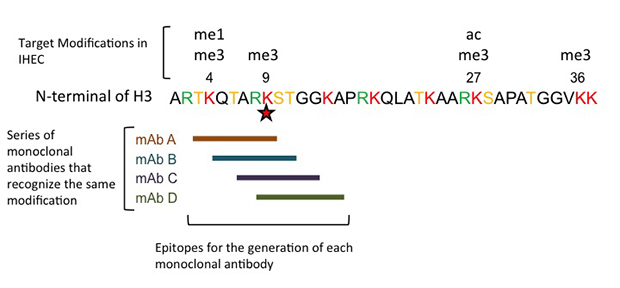
 Epigenome analysis using oligo-clonal antibody
Epigenome analysis using oligo-clonal antibody
ChIP-seq, large-scale sequencing combined with chromatin immuno-precipitation, is a popular method for the epigenetic analysis of histone modifications. The quality of the data depends on the quality of antibodies used and preparation method of chromatin fraction. Obviously, specificity of the histone modification-specific antibodies is particularly important, but already great amount of experiments has been carried out using polyclonal antibodies. This is a big problem, because supply of polyclonal antibody is limited. It is very hard to check reproducibility of the experiment when particular lot of polyclonal antibody is used. Furthermore, quality of commercially available polyclonal antibodies is sometimes low in terms of specificity. Therefore, it is essential to develop series of monoclonal antibodies with excellent specificities that can be supplied unlimitedly. However, in the case of monoclonal antibodies, the specificity is sometimes susceptible to modification in the vicinity of antigen and high-order folding structure of protein, thus single monoclonal antibody is not versatile. In addition, the affinity of mouse monoclonal antibody to the antigen is weak in general. Taken together, oligo-clonal antibody, the mixture of monoclonal antibodies that recognize the same target is ideal as a standard reagent. In other words, oligo-clonal antibody maintains sensitivity comparable to that of polyclonal antibody while maintaining the reproducibility and specificity of the monoclonal antibody.
In IHEC program, six types of histone modifications are targets. They are H3K4me1, H3K4me3, H3K9me3, H3K27me3, H3K27ac, and H3K36me3. In the vicinity of K4, K9, and K27 in particular, amino acids (R and S) that undergo several types of modifications are frequently found. Therefore, it is useful to produce monoclonal antibodies against series of overlapping epitopes (Figure 1) with the same modification. Currently, we are preparing series of antibodies for each histone modification to develop oligo-clonal antibody. So far, we could set up oligo-clonal system for H3K4me1, H3K4me3, H3K9me3, and H3K27me3. Efficiency of those antibodies are excellent in ChIP and we could get reproducible results even with small number of cells (10,000 cells).

Figure1 oligo-clonal antibody





